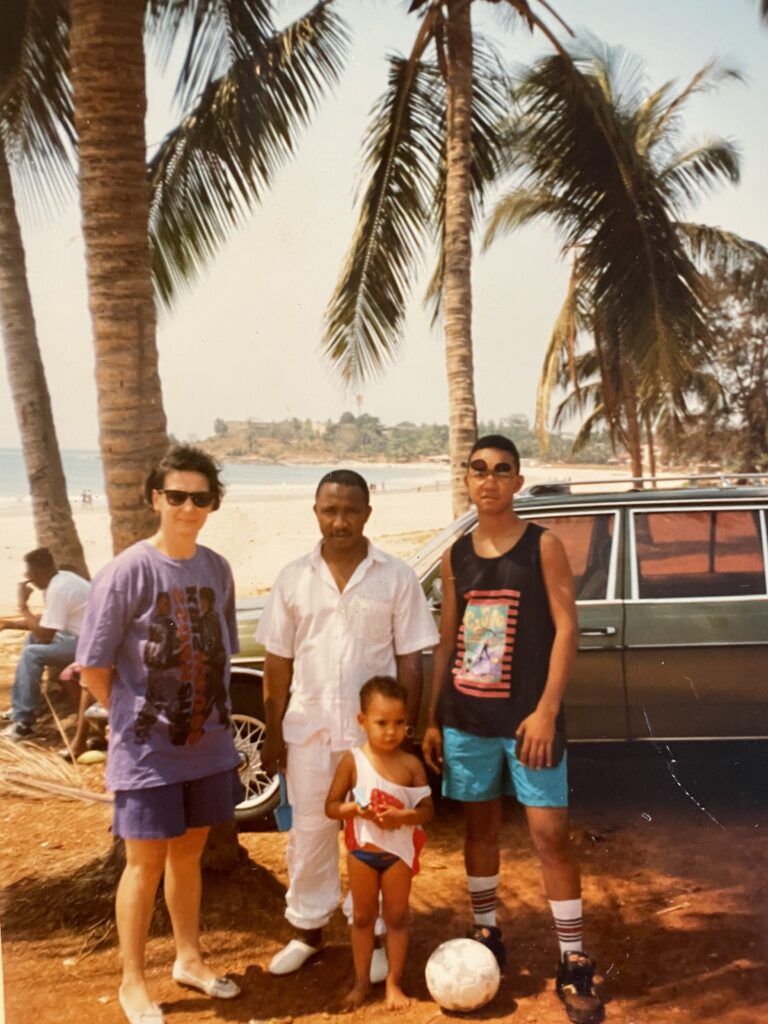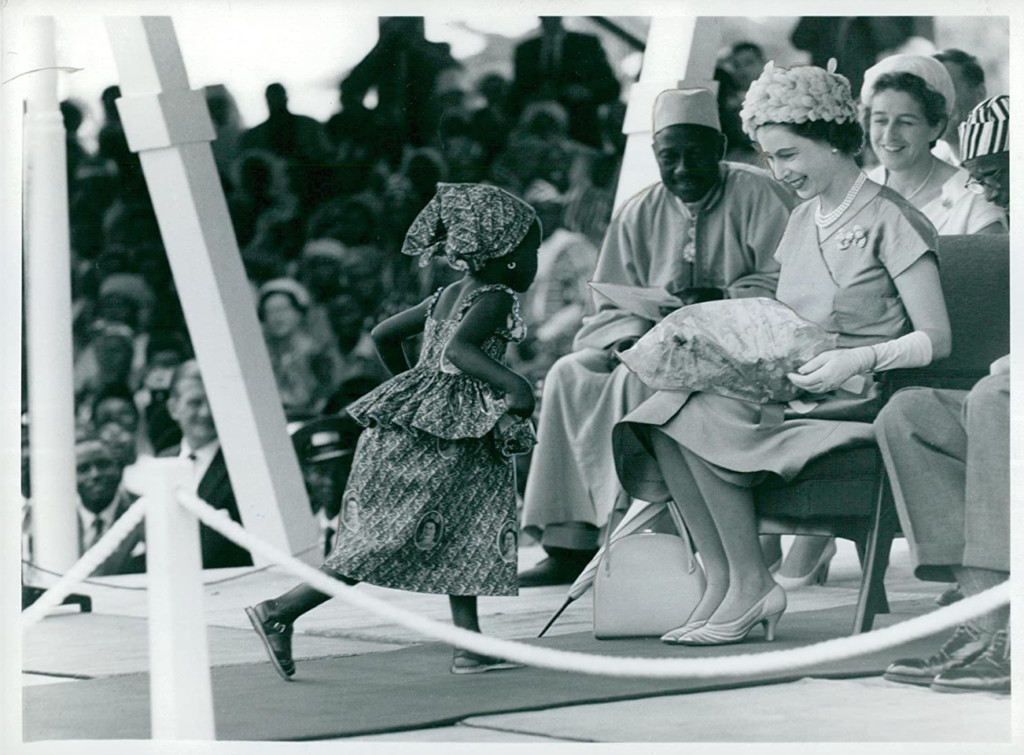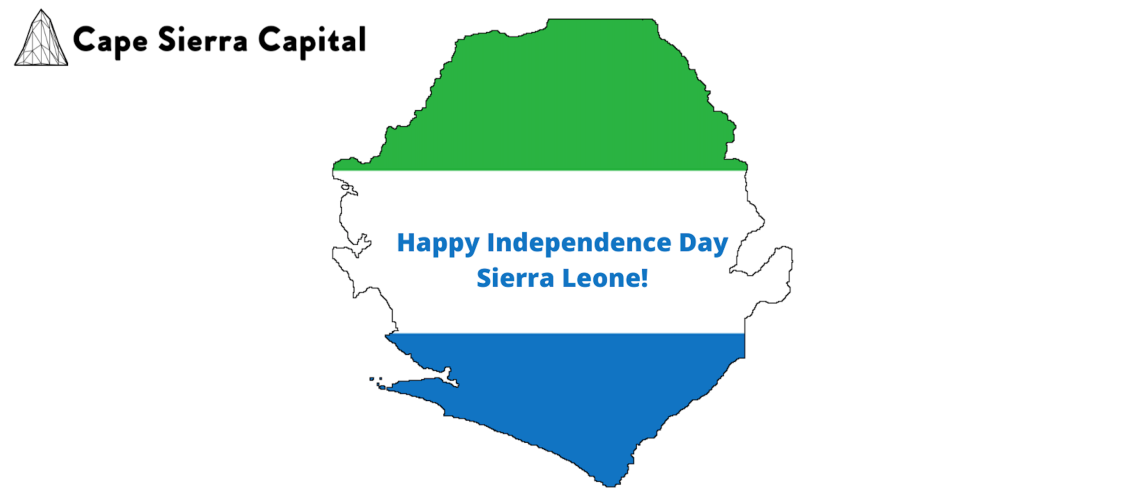Today marks the 61st birthday of Sierra Leone as a country. Happy Independence Day to Sierra Leone and all of my fellow Sierra Leoneans! As we celebrate this milestone there is much to be happy for and a lot to look forward to in Sierra Leone’s future.
I will fill in the blanks a little bit here. In my two immediate previous posts I talked about being born in Kiev, Ukraine to a Sierra Leonean father and Ukrainian mother. This story picks up when my dad finished his post graduate studies and my mom had exhausted all means of keeping us in Ukraine any longer. My dad had received his PhD in General Internal Medicine and he was excited to return to Sierra Leone and help ordinary Sierra Leoneans.
I arrived in Sierra Leone in September 1987, a few months shy of my 8th birthday. It was a dramatic shift from life in Ukraine. The language, the culture, the weather, the music, the food. I remember not being able to eat anything for a while because it was so spicy. Pepper is a big staple of Sierra Leonean cuisine. In those first few months I remember getting fish out of the cassava leaf sauce and washing it in a drinking glass of water just to dilute the pepper taste. That food was hot! My unaccustomed, unacclimated palette was yet to evolve. It wasn’t just me either. I remember my dad having a meeting with my aunt who cooked for us at the time, asking her to go easy on us with the spices and particularly pepper. She tasted the sauces she had just prepared, looked at my dad, and shook her head smiling. “There is absolutely no pepper in this,” she said. I immediately tried it. It took me about three seconds and then I ran to get some water.
The move was difficult. But it was not difficult for long. It was hard as I had no friends to start. I barely understood what people were saying. I missed my friends in Ukraine. School had just started there and all of my former classmates and friends were going into second grade. Here I was in Sierra Leone, not yet in school, with not much to do, stuck with spicy foods that I did not yet like, and that hurt when they came out the other end. The loneliness and shock of a new country lasted all of about two weeks. Soon I was enrolled in school. I started making friends. I had lots of new things to learn and all of a sudden life did not seem so bad. I found out that I was ahead in Math but was behind in English and I had to get to work. For those who dread moving with kids I always say–just do it! Kids are resilient. We adapt. It makes us stronger. Moving makes us learn how to deal with change. It creates much more resilient personalities and fosters lifelong adaptation skills.
I had studied English in Ukraine but soon found out that very few people on the streets of Freetown spoke English. Yes it was the official language, the lingua franca, but that did not mean much. The literacy rate was and still is low which means most people do not get the opportunity to learn English. Sierra Leone, a country of about 8 million people today, having an area slightly larger than West Virginia, has over twenty languages spoken. The language that everyone speaks on the streets is called Krio. Sierra Leone was used to resettle African slaves from North America who helped the British fight against the American War of Independence in the 1770s. The British promised freedom if the African slaves helped the British in the struggle against separatists who wanted to found a country called the United States of America. Britain promised to bring them back to the continent from which they were originally taken. The British had already established the Sierra Leone Company in West Africa. Eventually a city called Freetown was settled primarily by former African slaves from the New World. This population of resettled Africans brought with them many languages including English, Spanish, French and Portuguese. This language melange eventually evolved into today’s Krio which is widely spoken everywhere in Sierra Leone. I realized that I had to learn Krio fast. Not to worry: with full emersion I had lots of friends before the time I turned 8 around Christmas time.
Sierra Leone was a great place to grow up as a kid. We played soccer, literally on the street in front of my house. Occasionally our ball would hit the neighbor’s peanut stand which sent everyone scampering. Eventually one of us had to work up the courage to go apologize and try to get our ball back. Evenings were often spent with friends from the neighborhood fishing in the nearby streams that emptied into the Waterloo Creek, the River Rokel and the Atlantic Ocean. While listening to music on an old battery-powered stereo cassette tape player (my kids ask me what this is), talking lots of smack, we played Ludo or draughts (nobody calls this checkers in Sierra Leone) using candles or a kerosene lamp as there was usually no electricity. This would go late into the night until our stereo batteries would run out. Then we would listen to the sound of crickets and frogs. When our candles burned out or our kerosene ran out we would watch the bright moon and stars and talk some more. Life was good. School was fun. You could wear a t-shirt and shorts all year round. It was pretty much 80 degrees all year with the dry and rainy seasons. Most holidays, Christian and Muslim holidays alike, were celebrated at Freetown’s Lumley Beach sipping coconut water, eating jollof rice, listening to music and having a good time.
My dad did not earn a lot of money but he was a doctor in a country where there were less than a hundred doctors total. There was a lot of respect given to having that education and station in life in Sierra Leone. My mom worked at a pharmacy in town and later on she opened her own pharmacy. We were not rich but we were comfortable, definitely in the upper middle class of Sierra Leone society. We had a car, we had a decent house and we could even afford to travel to Ukraine every other year or so, to visit my grandmother.
My dad had a clinic in our house. I started assisting my dad in his medical practice around the time I turned 13. He did not, however, have the luxury of only practicing in his specialty. In Sierra Leone the everyday common man who needs medical help does not care about what kind of doctor you are. You are a doctor and that is what is important. Sometimes my dad would send patients to the right specialists but in many cases he was forced to help with whatever situation he was presented with as there were few good alternatives. I started out helping to dress patients’ wounds. Next I got to watch surgeries. Eventually, at 16, I performed an appendectomy with my dad assisting. I wanted to be a doctor. My dad was making a difference in people’s lives every day. He did not always get paid. Sometimes the patients brought a goat. Sometimes it was a bag of mangoes or a chicken. Sometimes they paid in cash. The clinic became a gathering place and to date my dad encounters Sierra Leoneans around the world that tell him that he treated them once. Medicine in Sierra Leone is still unencumbered by insurance today. There are few regulations. The doctor gets to know his patient, their family, they talk about every day issues. It feels personal and less like a machine, as it often does in the West. But it is basic. There is not a lot of sophisticated equipment or good facilities. Instead of autoclave machines and other sterilization methods we simply boiled operating surgery instruments in a kitchen pot for an hour and doused everything with chlorine and other disinfectants to keep things as clean as possible. I learned how to administer local and spinal anesthesia all before I turned 17.

Above: with my parents and sister at Lumley Beach in Freetown, 1995.
In its relatively short history as an independent country Sierra Leone has had more than its share of ups and downs. Since independence in 1961 we started out with a one political party rule system. In 1991 a civil war broke out in the Eastern Province of the country as a spillover from the conflict in neighboring Liberia (the only US colony in Africa). This conflict was predominantly in the diamond mining area. The Sierra Leone military got disenfranchised with the government and this eventually led to a largely bloodless military coup in 1992. Many people welcomed the change. Military rule paved the way for a democratic process in 1996 where the population had a choice among many political parties to pick the next president. The elections were declared free and fair but a few months later the country was again faced with a military coup. This time it was bloody, brutal and victimized many innocent people. This was the period when I was graduating secondary school. It was a scary time. My parents had a plan for me to pursue further studies in Germany where we had a relative. Through friends, fate and a little bit of luck I ended up in the United States. How all that happened is a story for another blog post.
Sierra Leone was in the depths of war through early 2002. Lots of atrocities happened. Many children lost their parents and were recruited to fight for the Revolutionary United Front or RUF. They were loosely called the Rebels and their ranks were filled with child soldiers. Many sexual crimes were committed against women and children. Many lives were lost and many people’s lives were broken. It was a horrible time. Gradually we pulled out of it. There was a Truth and Reconciliation Commission, a lot of rehabilitation of soldiers, a lot of physical and psychological rebuilding. Little by little things started getting better. We saw economic growth again. People started having hope again. Then the ebola outbreak happened in early 2014. This was another difficult period that lasted roughly 30 months. The poor healthcare infrastructure of the country did not help. But again Sierra Leone pulled out of it. The progress has been slow. We make two steps forward, then one step back, but we keep on moving forward.
It is easy to criticize people, governments and countries. It is easy to point to progress elsewhere and say “Why can’t we be more like them?” Yes, we can always do better. But we have to acknowledge that Sierra Leone is still a very young country that has been dealt some serious blows in its early years. China has been at it for millennia. European nations have been on the path of progress for centuries. The United States, a relatively young country at 246 years old, is more than four times as old as Sierra Leone. Progress: better systems, stronger oversight, better education, more accountability–these things do not happen overnight. Progress takes time and I am confident that we will get there. So Happy Independence Sierra Leone! Happy 61st Birthday! Let us learn from our difficult past and forge forward to build a country we can all be proud of!

Above: Queen Elizabeth visiting Sierra Leone shortly after Independence in 1961
Below: modern day Freetown



